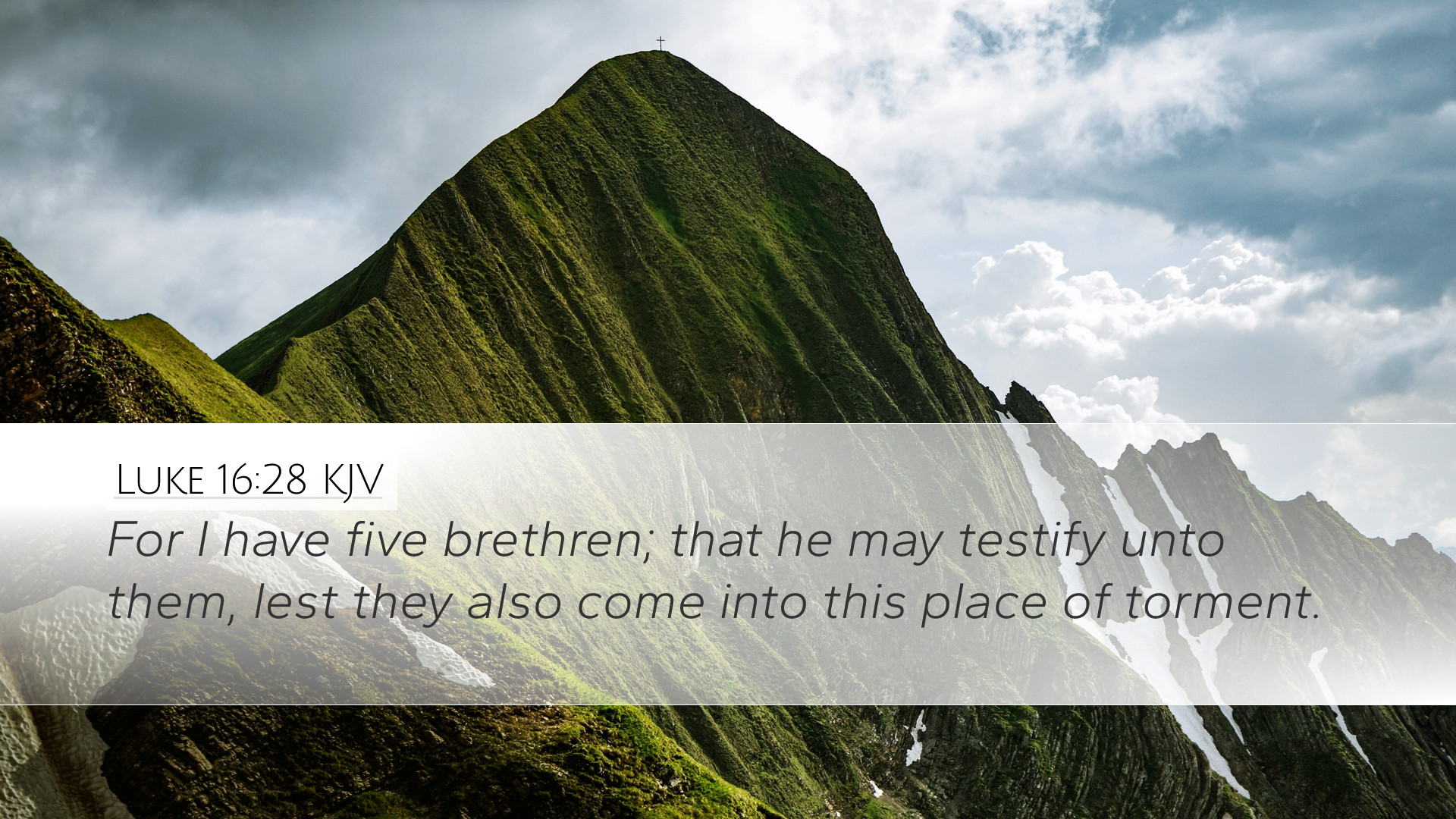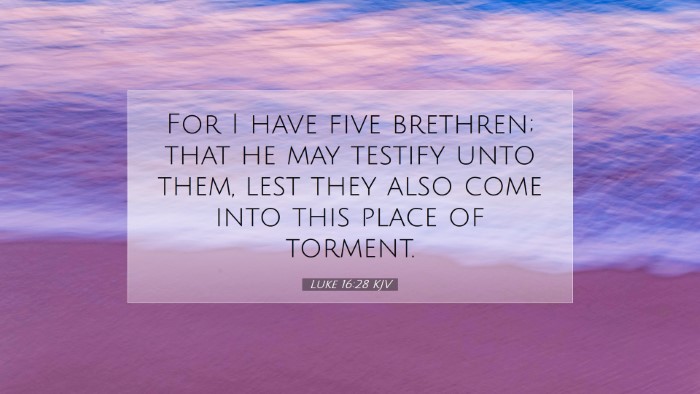Commentary on Luke 16:28
Luke 16:28 states:
"For I have five brethren; that he may testify unto them, lest they also come into this place of torment."
Contextual Background
This verse is part of the parable of the rich man and Lazarus, which conveys profound spiritual truths concerning wealth, poverty, and the afterlife. The rich man, after his death, finds himself in torment while Lazarus is comforted in Abraham's bosom. This parable serves to illustrate the consequences of one's earthly decisions and the stark differences in the afterlife based on those decisions.
Exegesis
The rich man's plea, as captured in Luke 16:28, reveals his concern for his living brothers. His words reflect an awareness of his situation and a desire to prevent his brothers from following him into the same fate. This moment encapsulates the idea that knowledge of one's eternal condition brings a profound awakening, even in the face of irreversible judgment.
Insights from Commentaries
Matthew Henry
According to Matthew Henry, the rich man's recognition of his brethren signifies the importance of second chances and the urgency of heeding spiritual warnings. Henry emphasizes that this plea shows how often people who reject God's warnings in life become desperate for their loved ones to embrace truth when faced with their eternal consequences. The rich man's request for Lazarus to be sent to warn his brothers underscores the belief that divine warnings can change one's fate.
Albert Barnes
Albert Barnes elaborates on the psychological dynamics at play in this verse. Barnes notes that the rich man, in his torment, develops a deep concern for others, illustrating a critical transformation from self-centeredness to a care for his family's spiritual well-being. Furthermore, Barnes argues that this moment suggests the inability to escape the consequences of one's choices in life and highlights the urgency of evangelism and the proclamation of the Gospel—a mission that must take precedence to prevent others from perdition.
Adam Clarke
Adam Clarke provides a broader theological reflection regarding the implications of the rich man's plea. He asserts that the rich man’s request for Lazarus to rise from the dead is particularly significant as it lays bare humanity's resistance to God’s warnings. Clarke points out that even a miraculous sign, like someone rising from the dead, would not be enough to convince those who are set against spiritual realities. This presents the paradox of human free will and the conviction of the Spirit and emphasizes the necessity of faith that transcends mere signs and wonders.
Theological Implications
The implications of Luke 16:28 are manifold. First, the verse highlights the reality of judgment and the afterlife, reinforcing the belief in heaven and hell. The existence of a place of torment is not merely allegorical; it serves as a stark warning against complacency regarding spiritual matters. Additionally, the rich man's plea reflects the necessity for individuals to evangelize and share the Gospel with those they love, indicating that knowledge and belief in Christ have eternal ramifications.
Practical Applications
-
Awareness of Eternal Consequences:
Pastors and church leaders are encouraged to preach on the realities of hell, urging congregants to acknowledge the urgency of repentance and faith in Christ. Understanding the severity of eternal separation from God can propel believers to evangelize more fervently.
-
Family and Loved Ones:
Students of the Bible should reflect on their relationships with family and friends. Are they actively sharing their faith and expressing concern for their loved ones' spiritual conditions? The rich man’s plea serves as a catalyst for believers to intercede for their families.
-
Evangelism:
This verse serves as a call for effective evangelistic efforts. The acknowledgment that the rich man desires someone to testify to his brothers demonstrates the role of personal testimony and urgency in communication of the Gospel.
Conclusion
In summary, Luke 16:28 serves as a powerful reminder of the eternal realities that await every individual. The rich man's terror at his situation compels us to consider our spiritual lives and those around us. Commentaries by Henry, Barnes, and Clarke collectively illuminate the urgent need for evangelism and the profound implications of faith. Thus, pastors, students, theologians, and scholars are encouraged to use this scripture as a basis for reflection and action, ensuring that the light of the Gospel reaches all, lest they find themselves in a place of torment.


